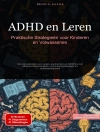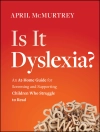A guide for helping students with weak Executive Function skills
to learn efficiently and effectively
Students with weak Executive Function skills need strong support
and specific strategies to help them learn in an efficient manner,
demonstrate what they know, and manage the daily demands of school.
This book shows teachers how to do exactly that, while also
managing the ebb and flow of their broader classroom needs. From
the author of the bestselling parenting book Late, Lost, and
Unprepared, comes a compilation of the most practical tools and
strategies, designed to be equally useful for children with EF
problems as well as all other students in the general education
classroom.
Rooted in solid research and classroom-tested experience, the
book is organized to help teachers negotiate the very fluid
challenges they face every day; educators will find strategies that
improve their classroom ‘flow’ and reduce the stress of struggling
to teach students with EF weaknesses.
* Includes proven strategies for teachers who must address the
needs of students with Executive Function deficits
* Contains information from noted experts Joyce Cooper-Kahn, a
child psychologist and Margaret Foster, an educator and learning
specialist
* Offers ways to extend learning and support strategies beyond
the classroom
* The book’s reproducible forms and handouts are available for
free download
This important book offers teachers specific strategies to help
students with EF deficits learn in an efficient manner, demonstrate
what they know, and manage the daily demands of school.
विषयसूची
About the Authors vii
Acknowledgments viii
Introduction 1
Part I Executive Functioning: The Basics 5
1 What Is Executive Functioning? 7
Definition 7
Core Executive Skills 9
How Do Executive Skills Develop? 13
To Sum Up 17
Time to Reflect 18
2 Putting a Face on Executive Functions: Students Who Struggle 19
Executive Dysfunction: A Description, Not a Diagnosis 19
The Normal Variability of Executive Functioning 20
The Vulnerability of Executive Functioning 21
Poorly Targeted Instruction 33
The Importance of Healthy Habits 34
Assessment 35
To Sum Up 38
Time to Reflect 39
Part II Interventions That Boost Executive Functions 41
3 The EF-Smart Classroom 45
The Tune-up Tools: Planning, Time, Repetition, and Mind-Set 46
The Targets: Culture, Planning, Routines, and Classroom Design 52
Planning for Change 72
To Sum Up 74
Time to Reflect 75
4 Supporting Students Who Need More Help 77
Planners 78
Materials 89
Reading 91
Writing 101
Math 105
To Sum Up 109
Time to Reflect 110
5 The EF-Smart School 111
‘Old School’ to New Schools 111
Faculty Meetings 115
Gathering References 116
The Magic Formula 118
To Sum Up 119
Time to Reflect 120
6 How the Specialist Can Help 121
Examining the Learning Task and Its EF Demands 122
Examining EF Skills for Levels of Automaticity and Independence: The Four-Quadrant Model 128
Consulting with Teachers 134
To Sum Up 136
Time to Reflect 137
7 Planning for Change 139
Defining a Problem of Practice 140
Planning and Reflection Guide 141
Using the Template and Guide: Case Examples 144
Plan to Monitor 157
To Sum Up 158
Time to Reflect 158
Conclusion: Helping All Students Blossom 159
Appendix A: The Top Three Accommodations for Students with EF Problems 161
Appendix B: Accessing the Online Materials 165
Endnotes 167
Index 171
लेखक के बारे में
Joyce Cooper-Kahn, Ph D, is a clinical psychologist specializing in children’s learning, behavioral, and emotional challenges. Coauthor of Late, Lost, and Unprepared, she presents frequently at national and international conferences.
Margaret Foster, MAed, is an instructor and consultant specializing in teaching and learning. She trains leaders internationally through WIDE World, a professional development program for educators.











